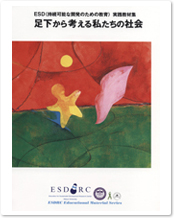 Published by ESD Research Center, Rikkyo University (ESDRC) in 2007 Published by ESD Research Center, Rikkyo University (ESDRC) in 2007
ESD Hands-on Learning Material Handbook
“ESD (Education for Sustainable Development) Hands-on Learning Material: Ashimoto kara kangaeru watashitachi no shakai”
This handbook was written by Nippon Christian Academy Kansai Seminar House and published by ESDRC. It comprehensively discusses 9 issues: human rights, environment, peace, poverty, multi-culturalism, social justice, lifestyle, civil participation, endogenous development, and discusses these issues as learning materials. It emphasizes the importance and inevitability of raising the awareness of “unsustainable issues in Japan” and addressing the issues from the perspective of citizen participation. This educational material would make a great contribution in a variety of sectors in promoting ESD.
■Index■
Introduction: Why “Ashimoto kara kangaeru (starting to think from your own here and now)”
Matrix of Issues and Educational Materials
Introduction of Basic Activity
1. People and Life: from the perspective of community
Material 1: All 100 yen shop – Thinking of the world from the 100 yen shop
Material 2: Think of our life from the standpoint of convenience stores
Material 3: Town development with the method of participatory development
2. People and Lifestyle: towards multi-culturalism
Material 4: The world as seen from beef on a dining table
Material 5: What is “homelessness”
Material 6: Living in “multi-cultural Japan”
3. Towards a peaceful society in the future
Material 7: Nuclear and global warming: Marshall and Japan
Material 8: Thinking of peace from Okinawa’s perspective
■How to order■
These books were made free for distribution. If they are of interest to you, please feel free to contact us by email with your name, home address, and phone number. The shipping fee for each book is as below.
・『Get Organized!』(Japanese translation)・・・290 yen
・『ESD (Education for Sustainable Development) Hands-on Learning Material: Ashimoto kara kangaeru watashitachi no shakai』・・・340 yen (This book is not available at the moment.)
If you would like to order both books at the same time, the total shipping for them is 340 yen.
ESD Research Center, Rikkyo University
3-34-1 Nishi-Ikebukuro, Toshima-ku,
Tokyo 171-8501 Japan
Tel/Fax:+81-3-3985-2686 Email: esdrc@grp.rikkyo.ne.jp
|